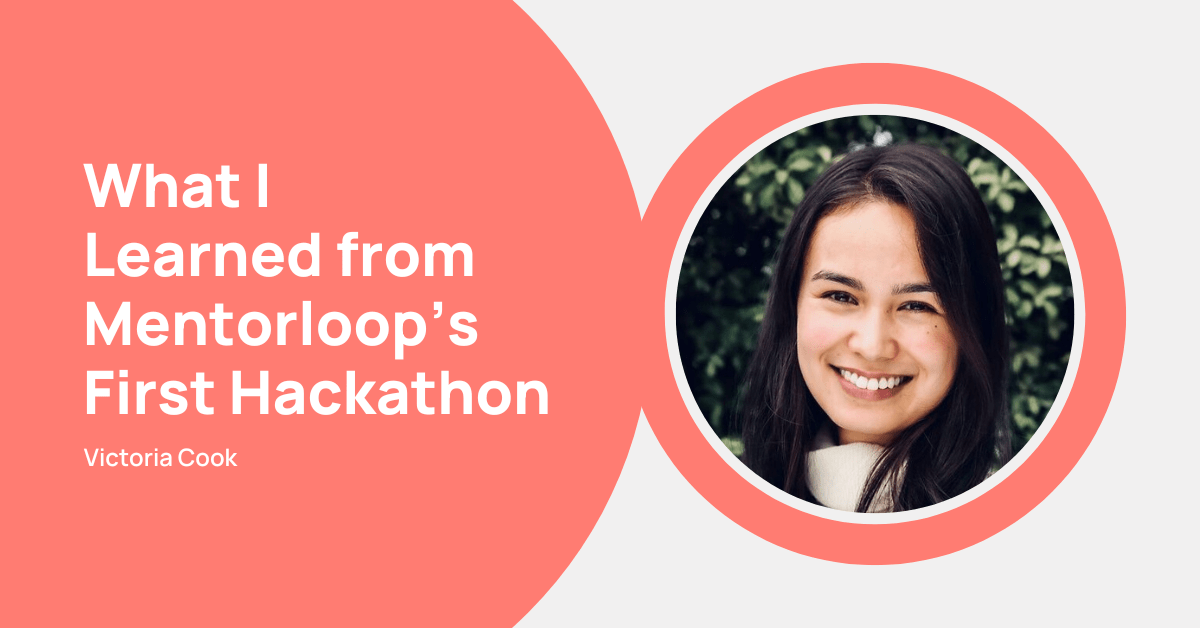Victoria is a software engineer at Mentorloop. She is also a bookworm, runner, language learning nerd, and cat mum to fur babies Cashew and Marshmallow. In this article, she shares her learnings from Mentorloop’s first hackathon.
In February 2024, we had our first inter-team hackathon at Mentorloop. It gave us all a chance to experiment with generative AI tools and work with team members we engineers don’t usually directly work alongside.

If you’re unfamiliar, a hackathon is a competitive social event where teams work together to build software from ideation to prototype. It usually has a theme or brief that teams must follow, often expanded to include the use of innovative new technology or tools to achieve a certain goal. Workplaces often run a hackathon to enable employees to let their ideas loose and experiment in a low-risk environment.
For this particular hackathon, engineers were split up and paired up with members of the sales, marketing, and customer success teams. The teams were given a brief to explore new ways that generative AI can improve our customers’ and users’ experience using Mentorloop.
Here are my takeaways from the event.
Experimenting isn’t just fun, it’s also extremely useful
Beyond simply being a fun exercise, I also found this process helpful because I got to train in the foundations of working with AI models. Getting better at this is essential as I believe AI is not just a trend – it will both touch and fundamentally transform the ways in which we live and work. So I consider staying up to date with how to work with it an essential part of my job. Additionally, given that the team is working on bolstering Mentorloop with AI to better support our users, getting a functional understanding of how to work with AI models will no doubt be useful in my work when it comes to building out new features and improving existing ones.
It was also a good exercise in suspending my normal working process and exploring a different way of working. I’m a “read-the-instructions-first” kind of person in that when working with new technology, I normally like to review documentation pretty thoroughly before attempting to build something with it. I find this is typically a more efficient approach in the long run. (”Days of coding saves hours of planning” is one of my favourite quotes from a previous lecturer.) Doing things this way gives me a good grasp of the principles and structure of the subject matter first, saving time later by avoiding sweeping refactoring.
However, I found that in the context of a hackathon where time pressure was tight, it was more effective to review the documentation briefly to get familiar with the basics and then just start building, jumping back into documentation when I needed to find the answer to a specific question.
Being challenged to work in this way taught me that it’s important to remain adaptable to changing contexts and requirements. It’s not always helpful or efficient to be thorough in every situation. This is useful learning for my work at Mentorloop because it’s not necessary (nor realistic!) to become an expert in every language, library, and framework I touch as part of my work. What is important is focusing on requirements and outcomes for our users, for which a good working knowledge of the foundations of languages, libraries and frameworks is usually sufficient.
And as fun as experimenting with new tech toys and tools is, I found that concurrently trying different options with the larger team to achieve a goal is a great way to make informed choices on what to add to the product roadmap while staying up to date in a rapidly changing and developing space.
Putting customers first
Everything we build at Mentorloop always has the customer and their users in mind. However, in our day-to-day work building new features doesn’t involve a lot of firsthand interaction with these customers and users. Working with the teams that have direct contact with customers, end users, and prospects and gaining insight from them allowed us to think more intentionally about how generative AI can be used to both passively and proactively support everyone who uses Mentorloop.
For example, customer-facing team members have better insight on how to proactively guide participants through their mentoring relationships – keeping in mind that most wouldn’t have been in a formal mentoring relationship before. Those in the sales, marketing, and customer success teams have a better understanding of indicators of mentoring success and the milestones mentors and mentees need to hit to progress (e.g. Have they booked their first meeting? Set a goal?) and these are things that aren’t always front of mind for engineers.
Having this insight then allows us to think of better ways to guide mentors and mentees, or at least ask the questions that will lead us there while we’re building features. What prompts and resources could help those who don’t know what to do next? How do we make sure the guidance we provide is relevant to where they are in their mentoring relationship?
Teamwork really does make the dream work
At Mentorloop, one of our values is “greater than the sum of our parts” which, in part, means that we punch above our collective weight by mentoring each other. This was fully in practice during the Hackathon.
Particularly under time pressure, we were all able to canvass more ideas and build more than we would have been able to alone. In this exercise, everyone was also able to contribute by working on tasks that play to each team member’s strengths, allowing us to deliver a better and more holistic solution together than we would have been able to if we worked alone.
The time pressure also meant we had to be able to divide and conquer as restrictions meant we had to make decisions early on that would ensure we were working as efficiently as possible.
One of the aims of the hackathon was to explore many different ways that we can use generative AI to make Mentorloop better. I think we were able to cover a lot of bases pretty well because of the way that we worked together during the hackathon. Having each team propose different solutions using different tools allowed us to really explore as many possibilities as we could and will no doubt serve us well in making decisions regarding the product roadmap in future.
Perspective
The pace and bubble of the hackathon meant that certain considerations we would usually have when building a feature were temporarily suspended, most notably, pricing and data security. Not because these weren’t important, but because we wanted to really stretch our imaginations and be as creative as we could in this exercise. And that’s exactly what happened at the hackathon! We were able to maximise creativity and rapidly create prototypes.
However, in my team, we couldn’t really discount the tradeoff that needed to happen in terms of allowing our solution to have access to a certain amount of user data in order to be helpful versus being mindful of data security. It was fun to refrain from thinking about practical constraints for the sake of this exercise but at the end of the day, it’s good to ground ourselves in the reality that we need to strike a balance. As creative as we want to be, we need to take into account pricing, scalability, and security, among a raft of other concerns. So, outside of the hackathon, when reviewing potential solutions or identifying any gaps to fill, any of these suspended considerations should be brought to the fore so that our solutions are ready for real-world implementation.
Speaking of solutions, the prototypes presented by each team during the hackathon were quite different, highlighting just how broad AI’s impact and application can be and how beneficial it is to have diverse perspectives working on the same problem. Having all of these ideas at our disposal now means that we in the Mentorloop team are ultimately much more equipped to make informed decisions if and when we incorporate more AI into the Mentorloop platform in future.
Final Thoughts
This hackathon was not just an exercise for us to explore more ways to use generative AI. It was also a way for us to walk the talk and mentor each other – learn from each other’s strengths, expertise, and experience while bringing the whole team much closer to the “why” of what we do – making good mentoring more accessible to more people.
In my opinion, the hackathon was a great success. It benefitted Mentorloop by producing multiple viable solutions while being a great bonding exercise for the team. It benefitted Mentorloop’s users by having the team explore ways to make their experience better (some of which I’m sure will make their way into the product in some form in the future). It also benefitted the individuals in the team by supporting everyone’s learning & development in understanding generative AI.
Here are my two biggest takeaways:
(1) It’s important to embrace innovation, remain curious, and explore new technologies to continuously improve our product. This is critical in a rapidly evolving technological landscape, where innovation is an important differentiator and key to remaining competitive.
(2) The benefits of collaboration cannot be overstated. From fostering innovation and creativity to gaining valuable insights into user needs, collaboration enables teams to achieve much more than they could alone. This is especially the case when collaboration is cross-functional because it brings together diverse perspectives, skill sets, and experiences to tackle challenges and develop holistic solutions. By leveraging the strengths of different team members and departments, cross-functional collaboration drives innovation forward and ensures that solutions are more comprehensive and effective.
The hackathon was a great experience to informally mentor and be mentored by members of the Mentorloop team while doing something fun and educational for everyone. I will definitely be taking these learnings moving forward, as I’m sure the rest of the team will too, as we continue working to make Mentorloop the best mentoring platform it can be.




